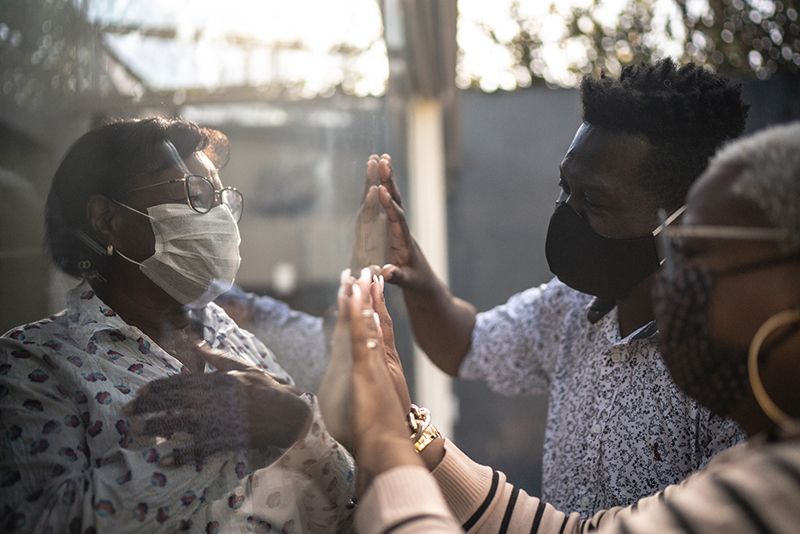Social scientist wins second NIH award in two months

The National Institutes of Health’s Rapid Acceleration of Diagnostics (RADx) initiative has awarded a $1.18 million grant to Andrew Plunk, PhD, MPH, Associate Professor of Pediatrics and social scientist in the Community Health and Research division of EVMS Pediatrics; and Ethlyn McQueen-Gibson, DNP, Associate Professor with Hampton University’s School of Nursing.
The grant will fund “Addressing Low-Income Housing Resident Mistrust In COVID-19 Guidance,” a study for which Dr. Plunk and Dr. McQueen-Gibson are Co-Principal Investigators.
“On behalf of our President William Harvey, PhD, and the entire faculty of Hampton University, I am honored and excited to be part of this exciting opportunity to address the impact of COVID-19 in underserved and vulnerable communities,” Dr. McQueen-Gibson says. “Hampton University stands as one of the oldest historically Black colleges and universities supporting research and preparing students to become researchers to address issues impacting health disparities in communities of color. We are proud to join forces with our colleagues at EVMS in this effort to engage the community in this research.”
Norfolk State University also is partnering on the research. “The NSU Center of Excellence for Minority Health Disparities is already imbedded in the community,” says Cynthia Burwell, EdD, Professor and Center Director. “This is yet another opportunity for the Center to participate in a collaborative effort against a pandemic that has disproportionately affected the African American community.”
EVMS is one of 32 institutions that received an NIH award through the RADx-UP program to support projects designed to rapidly implement COVID-19 testing strategies in populations disproportionately affected by the pandemic. These groups include African Americans, American Indians/Alaskan Natives, Latinos/Latinas, Native Hawaiians, older adults, pregnant women and those who are homeless or incarcerated.
“Our study is an expansion of the work that we're already doing with area low-income housing residents,” Dr. Plunk says. “We’ve still been engaging with folks throughout the pandemic using tools like Zoom. Mistrust in the information they were receiving about COVID-19 emerged as an important concern and we’re going to use community feedback to address that.”
A part of the Rapid Acceleration of Diagnostics (RADx) initiative, the RADX Underserved Populations (RADx-UP) program will support research that aims to better understand COVID-19 testing patterns among underserved and vulnerable populations; strengthen the data on disparities in infection rates, disease progression and outcomes; and develop strategies to reduce the disparities in COVID-19 testing.
“It is critical that all Americans have access to rapid, accurate diagnostics for COVID-19, especially underserved and vulnerable populations who are bearing the brunt of this disease,” said NIH Director Francis S. Collins, MD, PhD. “The RADx-UP program will help us better understand and alleviate the barriers to testing for those most vulnerable and reduce the burden of this disease.”
Dr. Plunk explains that due to the COVID-19 limitations placed on research right now, technology will facilitate virtual engagement with study participants, such as using videoconferencing platforms to hold focus groups.
“This project is going to be a big expansion of the virtual community engagement that we’ve been doing for the past several months,” he says. “We'll provide devices with webcams and Internet access to people who we engage with. And since we'll already be creating new opportunities for folks to use technology, we're also going to study how telehealth can play a role in promoting increased trust in the pandemic response.”
Among the 31 other institutions to receive RADx-UP awards are Johns Hopkins University, Yale University, Harvard School of Public Health, Stanford University, Brown University, Emory University and Rutgers Biomedical and Health Sciences.
This is Dr. Plunk’s second NIH award in less than two months. In August, he received a $3.1 million Method to Extend Research in Time (MERIT) Award for the study, “Using Differences in Perceived Legitimacy and Resident Compliance to Promote Fair and Effective Implementation of Smoke Free Housing.” The MERIT Award, which provides longer-term support for promising researchers within the first decade of their careers, is chosen by NIH staff from a pool of R01 applications with exceptional scores.